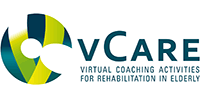While the vCare Pilot phase in Italy is finally about to begin, Casa Di Cura del Policlinico di Milano has organized an online workshop involving a panel of experts representing four hospitals, all of them recognized as Italian excellence in clinical research and practice.
The main objective was to collect external inputs before the launch of the Pilot phase. The pool of experts have approved the trial design. They however consider that the actual implementation of a rehabilitation@home service is still beyond the immediate horizon.
The four participating hospitals were:
- IRCCS Ospedale San Raffaele, Department of Neurological Diseases;
- IRCCS Humanitas Research Hospital, School of Physiotherapy, within the Nursing, Neuropsychiatry and Rehabilitation Sciences Department;
- IRCCS Fondazione Don Gnocchi, Research and Innovation Department;
- Instituto Prosperius Tiberino, Neurorehabilitation Department.
Here are the most relevant insights which emerged during the workshop:
First, the workgroup undersrood the need to involve the Italian regulatory agency, in order to standardize tele-rehabilitation prescriptions among the refunded programs for healthcare providers. Currently, refund policies of the National Health system still reflect the “traditional” rehabilitation, so reimbursement policies for digital services are shaped on the therapies performed in the ambulatory setting and not yet in the residential setting.
Second, from a scientific perspective, they acknowledged that literature recognizes the positive effects of tele-rehabilitation, pointing out in particular an increased adherence, when therapy is achieved in a game-based setting, They however mentioned that the entire Italian scene still lacks of a clear objective investigation regarding who could be the ideal “end user” who could benefit of services like the ones proposed by vCare. Starting from here, the pilot phase should help to answer a number of key questions such as:
- Which subjects are more responsive to tele-rehabilitation services ?
- What is the clinical and social profile of those subjects ?
- When is the best moment to take them in charge ?
- Which service configuration is best adapted to the vCare stroke use-case ?
Third, there is no clinical protocol evidence regarding the validation of sensors and technological devices able to effectively assess the outcome measures that the vCare project intends to reach. While the need remains for collecting large amounts of data in the next years, through further multicentric RCTs and research projects, already now the vCare pilot phase can provide a first, significant “real life” experience.
Fourth, machine learning and predictive instruments are considered the biggest challenge to support the clinical decision-making process, especially if corroborated by a huge amount of input and output structured data. At the current state of the art, automated therapeutic decisions are not yet integrated in clinical practice, as this is still an experimental stage, but it is a promising perspective.
Finally, the support of a virtual assistant might be more appropriate for supplying information to caregivers, rather than to directly coach the patient.
Don’t worry!!! vCare is following the right direction as pioneers of a new healthcare approach, built on evidence-based pathways and scientific validation. Stay tuned for the beginning of the Pilot phase, as soon as when we’ll know more…
